Related Research Articles

A gay village, also known as a gayborhood, is a geographical area with generally recognized boundaries that is inhabited or frequented by many lesbian, gay, bisexual, transgender, and queer (LGBT) people. Gay villages often contain a number of gay-oriented establishments, such as gay bars and pubs, nightclubs, bathhouses, restaurants, boutiques, and bookstores.

The LGBT community is a loosely defined grouping of lesbian, gay, bisexual, and transgender individuals united by a common culture and social movements. These communities generally celebrate pride, diversity, individuality, and sexuality. LGBT activists and sociologists see LGBT community-building as a counterweight to heterosexism, homophobia, biphobia, transphobia, sexualism, and conformist pressures that exist in the larger society. The term pride or sometimes gay pride expresses the LGBT community's identity and collective strength; pride parades provide both a prime example of the use and a demonstration of the general meaning of the term. The LGBT community is diverse in political affiliation. Not all people who are lesbian, gay, bisexual, or transgender consider themselves part of the LGBT community.

San Antonio International Airport is an international airport in San Antonio, Texas, United States. It is in Uptown Central San Antonio, about 8 miles (13 km) north of Downtown. It has three runways and covers 2,305 acres (933 ha). Its elevation is 809 feet (247 m) above sea level. SAT averages 260 daily departures and arrivals at its 27 gates, which serve 14 airlines flying non-stop to 53 destinations in the US and Mexico. The airport is the sixth busiest in Texas–after the airports at Dallas-Fort Worth, Houston, and Austin–as well as the 45th busiest airport in the United States by passenger traffic.
LGBT slang, LGBT speak, queer slang, or gay slang is a set of English slang lexicon used predominantly among LGBTQ+ people. It has been used in various languages since the early 20th century as a means by which members of the LGBTQ+ community identify themselves and speak in code with brevity and speed to others. The acronym LGBT was popularized in the 1990s and stands for Lesbian, Gay, Bisexual, and Transgender. It may refer to anyone who is non-heterosexual or non-cisgender, instead of exclusively to people who are lesbian, gay, bisexual, or transgender. To recognize this inclusion, a popular variant, LGBTQ, adds the letter Q for those who identify as queer or are questioning their sexual or gender identity.
The Log Cabin Republicans (LCR) is an organization affiliated with the Republican Party which advocates for equal rights for LGBT+ Americans, by educating the LGBT+ community and Republicans about each other.

In comics, LGBT themes are a relatively new concept, as lesbian, gay, bisexual, and transgender (LGBT) themes and characters were historically omitted from the content of comic books and their comic strip predecessors due to anti-gay censorship. LGBT existence was included only via innuendo, subtext and inference. However the practice of hiding LGBT characters in the early part of the twentieth century evolved into open inclusion in the late twentieth and early twenty-first centuries, and comics explored the challenges of coming-out, societal discrimination, and personal and romantic relationships between gay characters.
Queers Undermining Israeli Terrorism (QUIT!) is a gay San Francisco Bay Area political action group supporting boycott, divestment and sanctions against Israel; and opposing Pinkwashing of the ethnic cleansing of the Palestinian people. It was founded in early 2001 by a member of LAGAI-Queer Insurrection.
The Bay Area Reporter is a free weekly LGBT newspaper serving the LGBT communities in the San Francisco Bay Area. It is one of the largest-circulation LGBT newspapers in the United States, and the country's oldest continuously published newspaper of its kind.
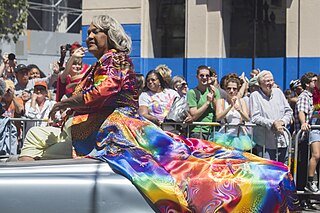
LGBT movements in the United States comprise an interwoven history of lesbian, gay, bisexual, transgender and allied social movements in the United States of America, beginning in the early 20th century. A commonly stated goal among these movements is social equality for LGBT people. Some have also focused on building LGBT communities or worked towards liberation for the broader society from biphobia, homophobia, and transphobia. LGBT movements organized today are made up of a wide range of political activism and cultural activity, including lobbying, street marches, social groups, media, art, and research. Sociologist Mary Bernstein writes: "For the lesbian and gay movement, then, cultural goals include challenging dominant constructions of masculinity and femininity, homophobia, and the primacy of the gendered heterosexual nuclear family (heteronormativity). Political goals include changing laws and policies in order to gain new rights, benefits, and protections from harm." Bernstein emphasizes that activists seek both types of goals in both the civil and political spheres.
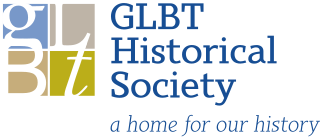
The GLBT Historical Society maintains an extensive collection of archival materials, artifacts and graphic arts relating to the history of LGBT people in the United States, with a focus on the LGBT communities of San Francisco and Northern California.
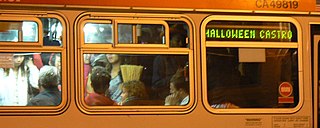
Halloween in the Castro was an annual Halloween celebration held in The Castro district of San Francisco, first held in the 1940s as a neighborhood costume contest. By the late 1970s, it had shifted from a children's event to a gay pride celebration that continued to grow into a massive annual street party in the 2000s.

The first English-language use of the word "bisexual" to refer to sexual orientation occurred in 1892.

The lesbian, gay, bisexual and transgender (LGBT) community in San Francisco is one of the largest and most prominent LGBT communities in the United States, and is one of the most important in the history of American LGBT rights and activism alongside New York City. The city itself has been described as "the original 'gay-friendly city'". LGBT culture is also active within companies that are based in Silicon Valley, which is located within the southern San Francisco Bay Area.
Rich's Houston' or simply Rich's, is a LGBT+ restaurant, lounge, and day/nightclub in Neartown, Houston, Texas, in the United States.

The St. Mary's Strip is an entertainment district in Midtown San Antonio. Located just north of downtown, "the Strip" encompasses a section of North St. Mary's that is roughly bounded by Mistletoe Avenue and Grayson Street. It is situated adjacent to the Pearl Brewery and is part of a rapidly redeveloping corridor of central San Antonio.
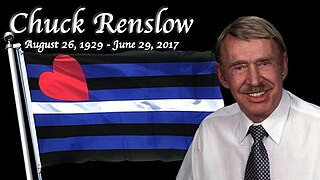
Charles "Chuck" Renslow was an American businessperson, known for pioneering homoerotic male photography in the mid-20th-century US, and establishing many landmarks of late-20th-century gay male culture, especially in the Chicago area. His accomplishments included the cofounding with Tony DeBlase of the Leather Archives and Museum, the cofounding with Dom Orejudos of the Gold Coast bar, Man's Country bathhouse, and the International Mr. Leather competition, and the founding by himself alone of Chicago's August White Party, and the magazines Triumph, Rawhide, and Mars. He was the romantic partner of Dom Orejudos and later Ron Ehemann.
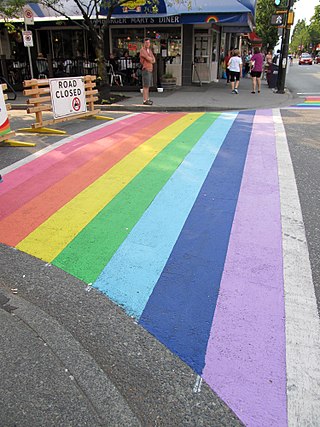
Vancouver's LGBT community is centered on Davie Village. Historically, LGBT people have also gathered in the Chinatown and Gastown neighborhoods. Former establishments include Dino's Turkish Baths, a gay bathhouse on Hastings, and the city's first drag bar, BJ's, on Pender Street.
LGBT culture in St. Louis is characterized by a long history of progressive activism as well as racial divisions and the city/county divide. St. Louis city is relatively liberal with multiple gayborhoods and several LGBT organizations. In 2019, Realtor.com dubbed St. Louis the 8th most LGBT-friendly city. Due to hostile legislation at the state level, however, it has become common for LGBT residents to relocate to Illinois for better protections and healthcare access.

Blue Chairs Resort by the Sea, is an LGBT-friendly hotel in Puerto Vallarta's Zona Romántica, in the Mexican state of Jalisco. The property has a rooftop bar called Blue Sunset Rooftop Bar.
References
- ↑ "Derelict Spaces and Country Places: The Emergence of San Antonio's Queer Community, 1940s-1970s". McNay Art Museum - Transamerica/n. 2019-06-12. Retrieved 2024-03-28.
- ↑ Nesbitt, Dylan Collins, Myra Arthur, Misael Gomez, Gavin (2022-06-28). "How did the strip on Main Street become San Antonio's gay district? KSAT Explains". KSAT. Retrieved 2024-03-28.
{{cite web}}: CS1 maint: multiple names: authors list (link)